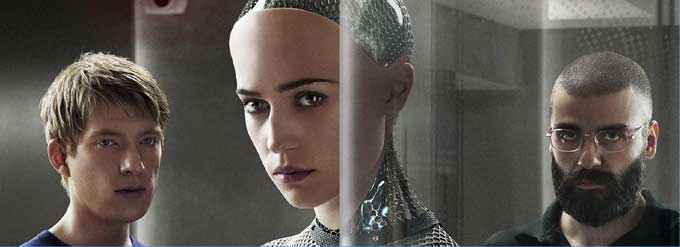Ex Machina
by Alex Race

The great science fiction films find themselves studying the next technological phenomenons, and how they will forever alter human consciousness for better or worse. Simply put, Ex Machina is a great science fiction film, and an instant classic in the artificial intelligence subgenre. In his revelatory directorial debut, Alex Garland is not content to explore just the ethical questions surrounding the future of conscious machines, as countless films have done before. He also broaches a number of other moral quandaries concerning diminished privacy in our technocratic society, intrusive surveillance by tech companies, and how these cultural changes can and will be used to manipulate people in unforeseen ways—with possibly frightening consequences.
Ex Machina stars Domhnall Gleeson as Caleb, a programmer for the fictional search engine company Blue Book (parallels to Google abound) who wins an employee lottery to spend a week with the reclusive owner of the company in his secluded mountain residence. That owner is Nathan, played by budding star Oscar Isaac, and he soon reveals to Caleb the true nature of his visit: he will perform a series of experiments, known as the “Turing test” in computer science, to determine if an artificial intelligence that Nathan has built is indistinguishable from a live human. Nathan names his A.I. Ava, a variation on “Eve.” Ava is played by Alicia Vikander, a former ballerina who uses her physicality to effortlessly portray the nuances of robotic motion. The special effects here are stunning. Her not-quite-human movement reaches the uncanny valley and gives you an eerie sensation that something is not entirely right, a sensation which finally explodes with the film’s final devastating twist.
Ex Machina deserves to be seen going in blind. The less you know, the more fun you’ll have with the film’s brilliant narrative. Director Garland also wrote the marvellous script, and his original plot doesn’t so much develop as it does unravel in front of your eyes. Some of the twists you may see coming, but it appears that Garland isn’t so concerned with the plot twists themselves, as he doesn’t punctuate them with dramatic camera shots or a sudden influx of climactic music. The viewer takes the role of Caleb in the film, getting manipulated and pulled in different directions by Nathan and Ava, so that each twist feels like a personal discovery. The final twist refocuses the entire movie in an alarming fashion, and will leave moviegoers talking about the film’s plot and themes for weeks afterwards.
Ex Machina is the most restrained and intelligent science fiction film to hit theaters since Spike Jonze’s Her. Like Her, and unlike most science fiction films, Ex Machina isn’t built on a foundation of explosive action sequences. It instead bottles its three main characters in a sterilized claustrophobic environment, and the growing discomfort is built from the characters’ surroundings and tense conversations. Garland introduces Ava with a beautiful camera shot, a silhouette profile of the A.I. which perfectly encapsulates the juxtaposition of what makes her human and not human. Ex Machina is naturally concerned with the question of what makes us human, as the contrast between metal wires and blood are shown several times throughout the film, and Nathan pontificates to Caleb on how the human brain itself is basically programmed to act and react in certain ways. How many science fiction films use a Jackson Pollack painting as a metaphor for human action? Add Ex Machina to that short list. Nathan also reveals to Caleb that he built Ava’s brain by hacking into tech companies’ databases, and using the billions of searches that have been run through Blue Book, to build a working model of human interaction which he incorporates into Ava’s hardware (or as Nathan calls it, “wetware,” because of its ability to constantly adapt and react to external stimuli). These plot points tap in to the modern problem of non-consenting surveillance and invasion of privacy, in a way that no other A.I film has done before.
Alex Garland has crafted a masterpiece of science fiction cinema that explores not just the possible ethical consequences of future technologies, but also the unethical use of technology today. With twists that will shock and haunt you, Ex Machina is more than worthy of your time at the theater. Bring your smartest friends along too—you’ll be talking about the movie and debating its themes with them for weeks.
Watch the trailer for Ex Machina
|
Issue Navigation> Issue Index > v14n16 (Week of Thursday, April 23) > Ex Machina This Week's Issue • Artvoice Daily • Artvoice TV • Events Calendar • Classifieds |









 Current Issue
Current Issue